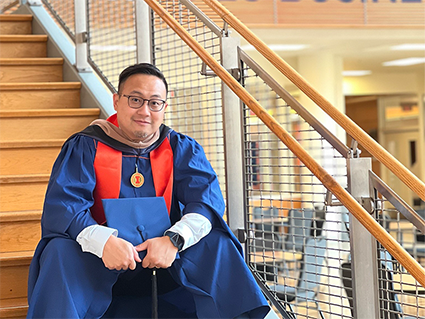Mar 12, 2024
Financial crimes analyst elevating career with Gies MBA
In this series, four graduates with diverse backgrounds share how they changed the trajectory of their careers by pursuing an online MBA program (iMBA) from Gies College of Business at the University of Illinois Urbana-Champaign.

Interview: William Cheung considered a number of career paths before deciding to focus on business. Now a financial crime analytic manager at HSBC, he shares how earning a Gies MBA as made him more knowledgeable and confident at his job and given him a better understanding of how to use data to solve problems and bring innovation into his workplace.
How did you become interested in business?
I’m a first generation immigrant from Hong Kong who came to America when I was 17 to go to college. After switching majors three times, I dropped out of college. After a few years working, I realized the thing I enjoyed most was serving others. Eventually, I enrolled in a seminary at San Jose, but to officially graduate, I needed to not only complete my master’s degree in divinity but also earn an undergraduate degree. I overcame all the challenges, and I thought I’d be a minister for life. But after working in the ministry for a short time, I decided it was time for a change. Then I saw a job opening in finance at HSBC in financial crime investigation captured my imagination.
How did your career at HSBC lead you to MBA?
At HSBC, I found a unique way to channel my desire to help people. When I first joined the bank, I investigated and reported activities that could be tied to criminals who launder money from dirty proceeds such as human trafficking, selling illegal drugs, bribery and corruption, fraud, or other criminal activities. It has become my way of making change in this world. My managers saw potential in me, but as I added more responsibility, I realized to excel I’d need to know more about business principles and an MBA would accomplish that.
How did you evaluate MBA programs?
I’d always done my best when I learned things on my own and had taught myself Excel and some programming languages. These disparate pieces of knowledge help, but I also realized that I needed something more organized for me to excel. So, I researched MBA programs that had a strong reputation that would be easily accessible to me during my off hours at work. It came down to Gies, which was a much more affordable, and superb quality program.
Which specializations did you choose?
Business Analytics and Entrepreneurship and Strategic Innovation. I’m the kind of person who is always looking for ways to do something better – whether it’s for consumers or an internal team. By focusing on innovation, I learned a framework for studying problems. My coursework taught me what questions to ask, how to make a recommendation, and the negotiation skills to sell it into an organization. The data analytics courses brought me officially into the data world, reinforcing my ability to process and organize data.
Which individual courses were especially helpful and interesting?
MBA 553: Entrepreneurship: From Startup to Growth focused on the process of an entrepreneurial venture and pitching venture capitalists who are looking for how to leverage data to organize a convincing presentation deck. Leveraging similar concepts, I learned how to approach executives and share my ideas in a simple, persuasive way. I was also exposed to different industries thanks to the data and business analytics courses. For a capstone project for Fisker, for example, I learned how to use data visualization to tell a story. We analyzed plant expansion opportunities for the EV automotive company through different indexes—everything from a country’s GDP to political stability.
How did you collaborate and network with international students on group projects like these?
The iMBA gave me many opportunities beyond classwork to network. I joined several affinity groups and met some amazing people on Workplace, an online collaborative software tool. Through the Gies alumni network, I was able to hear stories from engineers and VPs of US tech giants such as Amazon and eBay, director of a Brazilian manufacturer, a strategist working at an NGO, local politicians, and many more. Even for introverts like me, it was easy to ask: Can I learn more about your career path? Can you tell me more about your company or industry? The iMBA’s structure and network helps you connect the dots.
How did you fit coursework into the demands of your job?
HSBC is a firm that emphasizes continuous training, and even paid for part of my tuition. It did take away some time from my family on nights and weekends, but I learned to juggle it all, and I even took my wife on a vacation to Las Vegas.
How do you apply what you’ve learned to work day-to-day?
I’ve become much more confident handling data. I understand how to organize it, what controls to put into place, and how to build out a data quality management system. This has made everything more efficient. It’s good for the bank, and it’s good for my career at the bank.
How has the MBA changed the trajectory of your career?
The Gies iMBA program opened my eyes to how executives think. For my industry, I’m confident about navigating what’s on the horizon in compliance and how data, control and new technologies like AI and machine learning fit into what I do. I now have the knowledge and the hands-on experiences to take me to the next level.


